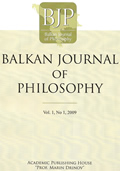Degree of Trust in the Western Balkans and Bulgaria
Degree of Trust in the Western Balkans and Bulgaria
Author(s): Ana Kuburić, Zorica S. KuburićSubject(s): Philosophy
Published by: Институт по философия и социология при БАН
Keywords: Western Balkans; trust; religion; minority; majority
Summary/Abstract: This article depicts empirical research conducted in the Western Balkans and Bulgaria (project Balkan Monitor 2006 conducted by the Gallup Europe) that is geared towards the trust that citizens have in national and international institutions, as well as people in general. Empirical research provides a realistic picture of trust as seen from the inside. According to the data collected, within the general population, the strongest percentage was given to neighbors, followed by the police and European Union. A considerable degree of attention was given to interreligious confidence and focus was placed on the number of adepts of a particular faith and the degree of confidence. From Islam, Orthodoxy and Catholicism to Protestantism, the degree of confidence diminishes, as well as the number of adherents, which points out to the relationship between minority and majority. The findings suggest that the degree of trust towards religious communities comes as a dominant attitude which means that these are the institutions that merit the greatest degree of trust. The exceptions are Albania and Kosovo where NATO comes first, whereas in Serbia NATO comes last. Ex- communists enjoy trust from 4% of the respondents whereas 24% completely rejects them. 8% of the respondents have a lot trust in people in general whereas 9% have no trust in people at all. For the purposes of this paper we will depict only a number of questions related to the degree of trust in various countries.
Journal: Balkan Journal of Philosophy
- Issue Year: II/2010
- Issue No: 1
- Page Range: 79-94
- Page Count: 16
- Language: English

